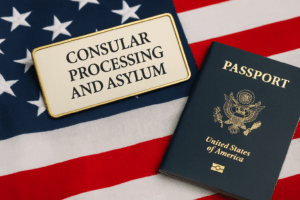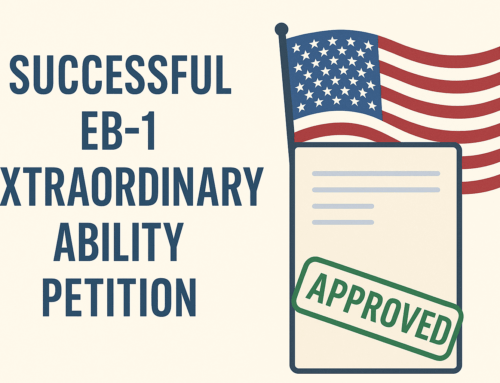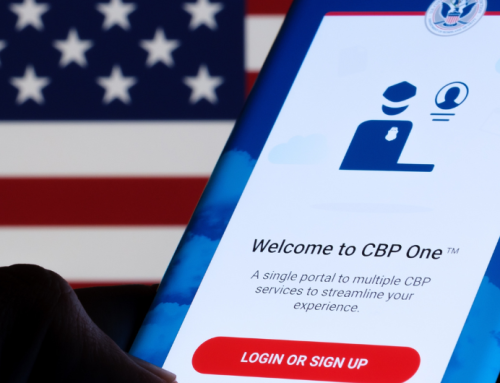
Immigrant Visa Processing While Asylum Is Pending (Consular Processing and Asylum)
In recent years, we have handled a growing number of cases where asylum applicants in the United States successfully pursued immigrant visas through consular processing while keeping their pending asylum applications open. Moreover, we have successfully used advance parole as a safeguard for their return. It is a complex strategy that requires careful planning and a deep understanding of potential risks. This is a practical guide to how consular processing and asylum cases can be successfully coordinated.
Many attorneys have reached out to me for guidance on this process. Therefore, I believe it is important to share some of my insights publicly to help others who may be considering similar cases, whether you are an attorney or an applicant researching your options.
Common Scenario
The typical fact pattern in these cases involves:
-
An individual entered the United States lawfully with a visa.
-
Filed an affirmative asylum application.
-
They remained in the United States after their initial status expired, with the asylum application pending.
-
Subsequently, the applicant became eligible for an immigrant visa, often through an employment-based category, NIW, EB-1, or family petition.
-
Now, they wish to pursue consular processing of the immigrant visa while keeping their asylum application pending. They may qualify for an immigrant visa based on approved employment-based petitions, NIW, or EB-1. Sometimes obtaining advance parole as a back-up to preserve the ability to return in case of an issue with their immigrant visa processing at the consulate.
My Experience with These Cases
I have successfully helped many clients in this exact situation over the years. Here are key lessons based on my experience:
How Consular Processing and Asylum Applications Can Be Strategically Combined
Consular processing and asylum applications are not mutually exclusive. Importantly, with proper legal planning, it is possible to pursue an immigrant visa through consular processing while maintaining a pending asylum application, though this strategy requires careful attention to legal risks and procedural details.
Preparing the DS-260 and Supporting Documents
When completing the DS-260 for consular processing:
-
If the client has a politically motivated criminal history in their home country, it is crucial to disclose this in the DS-260 and provide an explanatory addendum.
-
I always prepare a detailed memorandum in support and submit it to the consulate. This helps present the full context of the asylum claim and any prior political charges, and it frames the case in a way that supports a favorable decision.
-
In one recent case where the client had a pending defensive asylum application, we first secured voluntary departure (VD) before proceeding with consular processing. That client successfully received the immigrant visa and returned to the United States last month.
The Role of Advance Parole
Whenever possible, I recommend obtaining advance parole if the client has a pending affirmative asylum case. We typically request emergency advance parole through the local USCIS field office. The Washington Field Office in Fairfax, Virginia, has been quite accommodating in issuing AP.
Advance parole serves as a safety net. If issues arise during consular processing or if delays occur, the client can return to the United States without abandoning the asylum application.
Critical Risks and Considerations
Several important risks must be analyzed before pursuing this path:
-
Potential misrepresentation: If the asylum application contains information about prior politically motivated charges or arrests, this can raise concerns about possible misrepresentation in the initial nonimmigrant visa application. Many asylum applicants do not disclose their arrests or detentions in their initial nonimmigrant visa (e.g. B-1/B-2) application out of fear that they will be denied a visa and will not be able to flee their country of persecution. This is usually not an issue or reason for denial in their subsequent asylum case. However, this may become a serious issue for their immigrant visa processing at the consulate. This issue must be carefully reviewed. In some cases, a waiver may be required.
-
Unlawful presence (ULP) bans: Depending on the client’s timeline and status history, a ULP bar could apply. It is essential to calculate this carefully and address it proactively. Generally, individuals who spend more than 6 months in the US after their status expiration will incur a 3-year ban. If they spend more than 12 months in the US without permission, there may be a 10-year ban. There are exceptions which may apply. Therefore, this must be carefully analyzed.
-
Frivolous asylum concerns: In most cases, using a third-country consulate for processing is a better option to avoid triggering accusations of filing a frivolous asylum application.
Final Thoughts
These cases require a highly individualized strategy. There is no one-size-fits-all approach. In each case, I conduct a thorough analysis of the client’s status history, asylum record, grounds of inadmissibility, and timing considerations. I also coordinate closely with the consulate to support a smooth process.
It is important to be realistic about the risks and to prepare comprehensive supporting documentation. I always advise clients transparently about both the opportunities and potential pitfalls.
Conclusion
If you are an attorney handling such a case or an applicant researching this strategy, know that this process is possible with the right preparation and careful attention to detail. Consular processing and asylum can be coordinated. I have successfully assisted multiple clients through this path and am happy to share my experience.
If you would like to discuss a specific case or need guidance on preparing DS-260 filings, waiver requests, or supporting memoranda, feel free to contact me.
Ismail T. Shahtakhtinski, Esq.
Managing Attorney and Counselor at Law
I.S. Law Firm, PLLC






